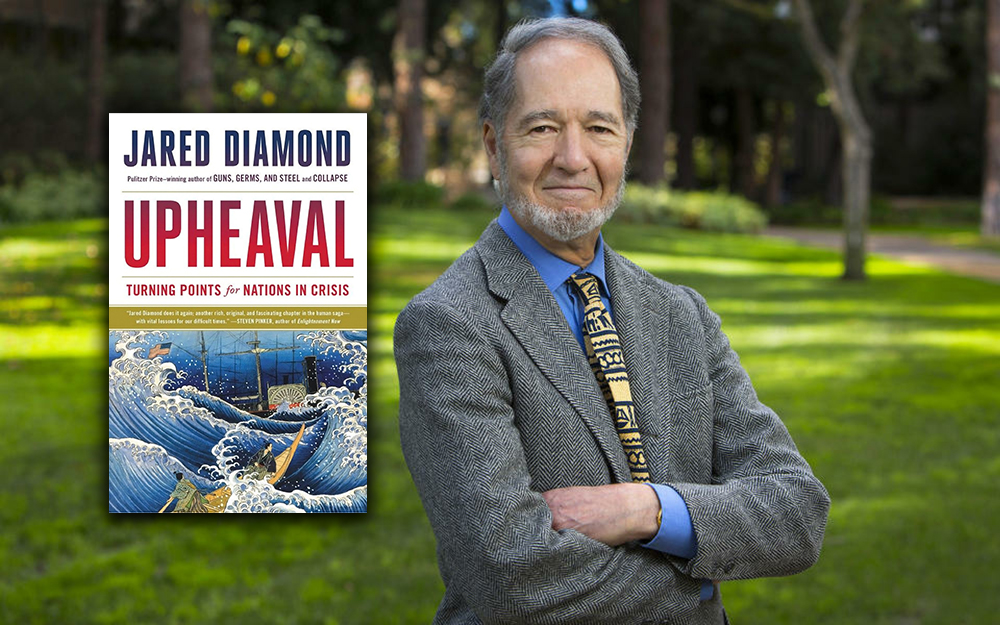
By Heidi Simmons
—–
Upheaval
by Jared Diamond – Nonfiction
—–
At times, it can feel like the world has gone completely crazy. Climate change, racism, religious fanaticism, political dissonances seem to be growing out of control, and approaching catastrophic levels. In Upheaval: Turning Points for Nations in Crisis (Little Brown, 502 pages), Pulitzer Prize-winning author Jared Diamond explores the history and psychology of six nations that successfully overcame — and recovered from critical events.
Diamond’s narrative premise is if we can reflect on past crises, understand how they came about and were resolved, perhaps we can prevent future crises. He does this by adapting “short-term crisis therapy,” a professionally designated table of 12 factors related to the outcomes of personal crises, to evaluate and examine national crises.
Finland, Japan, Chile, Indonesia, Germany and Australia serve as case studies. Each is a fascinating account of an upheaval and successful recovery that moved the country and its people forward.
Small Finland faced down the big Soviet Union; Japan was forced out of isolation; Chile overcame a deadly coup; Indonesia’s coup formed a nation without a common language; Germany accepted responsibility to move forward after WWII; and Australia chose independence from Britain. In each scenario, the country’s established way of coping was challenged, and a new way of thinking had to emerge in order to succeed as a nation.
In some of the above countries, the crises were immediate and required quick action. While in other countries, the crises gradually grew until it came to a head.
After recounting the histories in brief but significant detail, Diamond uses the psychological tool of the “personal crisis” table to show how the same 12 factors that help individuals get through a crisis, also works for nations.
In summary, the 12 factors for overcoming crisis as a nation include: Acknowledgment of the crisis; Acceptance; Delineation; Getting assistance; Using previous models; National identity; Honest appraisal; Previous experience; Patience; Flexibility; Core values; Geopolitical constraints.
Each of the nations included chose to embark on a process of “selective change” to resolve the crisis, and Diamond delivers the highs and lows of that process.
The final chapters of the book turn to the current conditions and pending crises of Japan, the United States and the world!
Upheaval is well-written, researched and told. Diamond is thoughtful, engaged and non-judgmental. He is an academic scholar and his very readable narrative combines history, anthropology, geography and psychology to deliver a comprehensive view of our human and world condition.
Diamond does not shy away from what he considers the most pressing issues of the day and spells out the direct threats to our democracy and planet.
I especially liked Diamond’s interpretations and insights of the “12 factors” pertaining to the countries. It is a reminder that human beings are similar all over the world no matter cultural differences. We do not, as individuals or citizens, exist in a vacuum. I was impressed by the nations that acted with humility, compassion, and bravery to build an even greater national self-esteem and identity.
Germany successfully moved forward once they owned responsibility for their actions in WWI and WWII, apologized and began to teach the historic truth to their children so as to never repeat the behaviors. Japan still refuses to acknowledge or apologize for the atrocities against China and Korea, which keeps the country from a more impactful future.
Upheaval is not without hope. History is a beautiful thing that helps us understand how we have come to be where we are. Diamond concludes that there are national leaders and developing institutions that value the lessons of history and are actively addressing the most critical issues.
I have recommended Upheaval in several of my columns and will continue to do so. It’s a must read. Diamond is a national treasure. This is an important book for, and of, our time.
Knowing what we know from the lessons of history, if we do not directly face the crises kicking at our door, we fail as nations — and human beings.












































